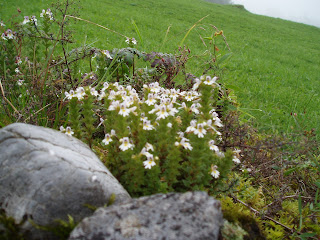
Hello everyone!
There has been so much going on I haven't even had time to post- Zurich and Switzerland offer incredible activities to do all the time. :) Last weekend Charlotte, Joseph, and I travelled to Berg Titlis, just outside Luzern, and about a 2 hour train ride away from Zurich....you can read more about this in Joseph's post below. It was absolutely AMAZING when the fog cleared away...who knew we had been hiking next to gorgeous mountains for most of our 4 hour hike?? Ahh yes, that's another thing we learned: when
 a hike in Switzerland says it will take 2.5 hours, better make that a little bit longer if you are inexperienced in hiking the Alps (no matter how fit you might think you are!) and for all the pictures you stop to take along the way! The top was snow-covered and breath-taking...better than what I had imagined. We celebrated reaching the top with some Swiss chocolate (ok, even if we did take the Rotair cable car as Joseph mentioned.) I spent a lot of the hike looking for Edelweiss, but alas, couldn't find any. The picture above is of a different flower.
a hike in Switzerland says it will take 2.5 hours, better make that a little bit longer if you are inexperienced in hiking the Alps (no matter how fit you might think you are!) and for all the pictures you stop to take along the way! The top was snow-covered and breath-taking...better than what I had imagined. We celebrated reaching the top with some Swiss chocolate (ok, even if we did take the Rotair cable car as Joseph mentioned.) I spent a lot of the hike looking for Edelweiss, but alas, couldn't find any. The picture above is of a different flower.During the week I focused on research (still collecting some data), rowing, and the day to day activities, and of course when time allows, planning out my next weekend. This past weekend was chock full of things! Friday night was the "Lange Nacht der Forschung", which means "long night of research". The ETH and several other universities and local companies here presented their research projects to the public in large tents that were set up along the lake in 2 locations. A ship was provided to transport you back and forth to each location to see the research. Very interesting research! A robot that can juggle, a robot that is being planned to go to the moon, a computer program/machine that scans a field for weeds and then sprays only the weeds with about 99.9% accuracy, and a study into the crime statistics of Switzerland and surrounding countries were just some of the things I saw. Of course there was also free chocolate. :)
Saturday was spent shopping and roaming around the Altstadt of Zurich, rowing, and trying to get tickets to one of the Zurich film festival movies...which ended up being sold out, but Joseph got to go. Sunday was also very busy with Ruderschule, church, climbing up Uetliberg, and watching one of the Zurich film festival movies called "Noodle". I would highly recommend the film! Very well done, and very deserving to be part of the film festival. The hike up to Uetliberg before seeing the film certainly wiped me out so that I was glad to sit in a movie theater. With such a steep incline, it's no wonder I'm feeling it in my legs today... but this Uetliberg hike was certainly no comparison to Titlis, which was an unending upward climb. :)
alright, back to work!
Schöne Woche miteinander,
Katherine




















